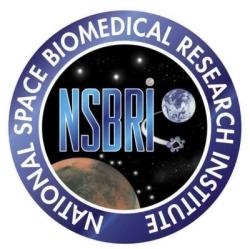Wed, Aug 21, 2013
Soliciting For A Center For Space Radiation Research
The National Space Biomedical Research Institute (NSBRI) is soliciting for program proposals to establish a Center for Space Radiation Research (CSRR). The CSRR will build upon important discoveries made by the NSBRI Center of Acute Radiation Research and extend them by characterizing and quantifying the effects of space radiation on living systems. Operating in close partnership with NASA's Human Research Program, the CSRR will be tasked with researching the acute effects of space radiation, as well as the longer term, so-called "degenerative" effects of space radiation on the cardiovascular and circulatory systems. Accordingly, the CSRR will work to reduce the radiation related health risks that will be encountered by astronaut crews during future missions to an asteroid, the Moon or Mars. This research announcement entitled "Center for Space Radiation Research" was released by NSBRI on August 14, 2013.

The CSRR will combine exposures to both solar and galactic particles, thereby more closely mimicking the environment actually experienced by astronauts during exploration missions. Pharmaceutical countermeasures will also be evaluated for their ability to mitigate the harmful effects of space radiation. Scientific discoveries made by the CSRR will not only enable safe and productive human exploration of space, but may also have the potential to improve life on Earth.
The CSRR will use a systems biology approach to characterize the effects of space radiation by combining physiological observations with new 21st century integrated -omics techniques, such as genomics, proteomics and metabolomics. This strategy will facilitate the correlation of observed health effects with the more fundamental underlying genetic and bimolecular changes that occur in response to radiation, thereby advancing knowledge and providing possible new options for the development and deployment of radiological countermeasures.
This NSBRI request for applications, (RFA) may be viewed online under the Funding Opportunities menu, within the Current Announcements section. The RFA is also available via the NASA Research Opportunities homepage by navigating through the menu listings "Solicitations" to "Open Solicitations." On the Open Solicitations page, researchers should select "NSBRIRFA1302" from the list of solicitations.
Applications should be submitted using NSPIRES, the deadline for application submittal of 5 P.M. Central Standard Time on December 12, 2013. Researchers intending to submit a full proposal must submit a notice of intent by 5 P.M. Central Time on September 13, 2013. Participation is open to all categories of U.S. based organizations, including educational institutions, industry, nonprofit organizations, NASA centers, and other Government agencies. Both notices of intent and program proposals must be submitted electronically via NSPIRES.
More News
From 2023 (YouTube Version): Legacy of a Titan Robert (Bob) Anderson Hoover was a fighter pilot, test pilot, flight instructor, and air show superstar. More so, Bob Hoover was an i>[...]
Get The Latest in Aviation News NOW on Instagram Are you on Instagram yet? It's been around for a few years, quietly picking up traction mostly thanks to everybody's new obsession >[...]
Aero Linx: B-52H Stratofortress The B-52H Stratofortress is a long-range, heavy bomber that can perform a variety of missions. The bomber is capable of flying at high subsonic spee>[...]
Altimeter Setting The barometric pressure reading used to adjust a pressure altimeter for variations in existing atmospheric pressure or to the standard altimeter setting (29.92).>[...]
"Knowing that we play an active part in bettering people's lives is extremely rewarding. My team and I are very thankful for the opportunity to be here and to help in any way we ca>[...]
 Classic Aero-TV: Remembering Bob Hoover
Classic Aero-TV: Remembering Bob Hoover ANN FAQ: Follow Us On Instagram!
ANN FAQ: Follow Us On Instagram! ANN's Daily Aero-Linx (05.15.24)
ANN's Daily Aero-Linx (05.15.24) ANN's Daily Aero-Term (05.15.24):Altimeter Setting
ANN's Daily Aero-Term (05.15.24):Altimeter Setting Aero-News: Quote of the Day (05.16.24)
Aero-News: Quote of the Day (05.16.24)



